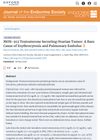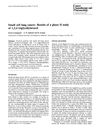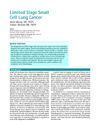 April 2020 in “Journal of the Endocrine Society”
April 2020 in “Journal of the Endocrine Society” A rare ovarian tumor that produced testosterone caused a blood clot in the lungs and increased red blood cells in a woman.
 1 citations,
July 1988 in “JAMA”
1 citations,
July 1988 in “JAMA” Metronidazole can cause lung disease.
28 citations,
January 1999 in “Dermatology” Fluconazole is the preferred treatment for deep skin infections in immunocompromised patients.
19 citations,
October 2021 in “Nano letters” Gold nanoparticles can safely and effectively treat psoriasis without drugs and have no major side effects.
 25 citations,
September 2013 in “Journal of thoracic oncology”
25 citations,
September 2013 in “Journal of thoracic oncology” Soy isoflavones can protect lung tissue from radiation damage.
4 citations,
January 2022 in “OAlib” Antioxidants might help with Long Covid by addressing oxidative stress and nutrient imbalances.
 165 citations,
September 2001 in “Genes & development”
165 citations,
September 2001 in “Genes & development” CDP is crucial for lung and hair follicle cell development.

Flubendazole in a nanoemulsion can potentially treat lung cancer and cryptococcal meningitis effectively and safely.
 2 citations,
May 2023 in “Cancer medicine”
2 citations,
May 2023 in “Cancer medicine” KRT80 may worsen cancer by increasing growth and spread, but its full effects on treatment and outcomes need more research.
 9 citations,
July 2021 in “Essays in Biochemistry”
9 citations,
July 2021 in “Essays in Biochemistry” Sex hormones may influence COVID-19 severity, with males at higher risk, and certain hormone therapies could potentially treat the virus.
 9 citations,
November 2011 in “Cytokine”
9 citations,
November 2011 in “Cytokine” Finasteride helps reduce lung inflammation and damage after trauma and infection.
 1 citations,
January 2021 in “Arthritis Research & Therapy”
1 citations,
January 2021 in “Arthritis Research & Therapy” About 8% of people with systemic lupus erythematosus have chronic scarring alopecia, with certain symptoms and positive antibodies increasing the risk, while immunosuppressants may lower it.
 April 2024 in “Journal of pharmacy & pharmacognosy research”
April 2024 in “Journal of pharmacy & pharmacognosy research” A compound from Calophyllum inophyllum L. leaf may help treat non-small cell lung cancer.
 6 citations,
May 1986 in “Cancer Chemotherapy and Pharmacology”
6 citations,
May 1986 in “Cancer Chemotherapy and Pharmacology” The drug TGU was ineffective against small cell lung cancer and caused significant bone marrow suppression.
 14 citations,
January 2001 in “Current Treatment Options in Oncology”
14 citations,
January 2001 in “Current Treatment Options in Oncology” Treat limited stage small cell lung cancer with chemotherapy and radiation, and consider preventive brain radiation for better survival chances.
Naproxen can cause serious lung issues, but high-dose aspirin might be safer.
24 citations,
December 1997 in “Mayo Clinic proceedings” Carbamazepine may cause lung problems and lupus-like symptoms, which can improve after stopping the drug.
 1 citations,
January 2022 in “Monaldi archives for chest disease”
1 citations,
January 2022 in “Monaldi archives for chest disease” After severe COVID-19, lung damage can improve, detected effectively by lung-ultrasound, and high pressure support during hospitalization can increase lung artery size. Also, about 22% of patients had lung blood clots, and when treated, they recovered faster.
A 69-year-old smoker was wrongly diagnosed with lung cancer but actually had a rare lymphatic system disorder.
13 citations,
August 2018 in “Life sciences” Kang-ai injection with platinum-based chemotherapy improves tumor response and immune function while reducing side effects in advanced lung cancer.
 September 2019 in “Rheumatology advances in practice”
September 2019 in “Rheumatology advances in practice” Diagnosing and treating rapidly worsening lung disease is difficult and requires better guidelines and understanding.
 13 citations,
May 2019 in “Cancer Prevention Research”
13 citations,
May 2019 in “Cancer Prevention Research” Grape seed extract may safely and effectively help prevent lung cancer.
1 citations,
February 2020 Resveratrol-loaded nanoparticles show promise for lung cancer treatment.
April 2021 in “The journal of heart and lung transplantation/The Journal of heart and lung transplantation” Untreated Sheehan's Syndrome caused severe heart failure in a woman, which improved with hormone and heart failure treatment.
 4 citations,
January 1987 in “Journal of The American Academy of Dermatology”
4 citations,
January 1987 in “Journal of The American Academy of Dermatology” A man with both skin lesions and lung cancer improved quickly with chemotherapy, suggesting the skin condition might be a reaction to immune system injury.
January 2021 in “International Journal of Immunology” Early detection and aggressive treatment of severe lung complications in lupus are crucial to improve survival.
 6 citations,
October 1979 in “Chest”
6 citations,
October 1979 in “Chest” Minoxidil lowers blood pressure without worsening lung pressure but can cause increased hair growth.
 5 citations,
May 2020 in “Dermatologic Therapy”
5 citations,
May 2020 in “Dermatologic Therapy” 5-alpha reductase inhibitors might worsen lung recovery in COVID-19 patients, suggesting a pause in their use.

COVID-19 can cause long-term lung, skin, and mental health problems, especially in women, people with other health issues, and those who had severe COVID-19.
 2 citations,
June 2020 in “Research Square (Research Square)”
2 citations,
June 2020 in “Research Square (Research Square)” A prostate cancer drug can lower the levels of a protein that the coronavirus uses to enter lung cells.




















